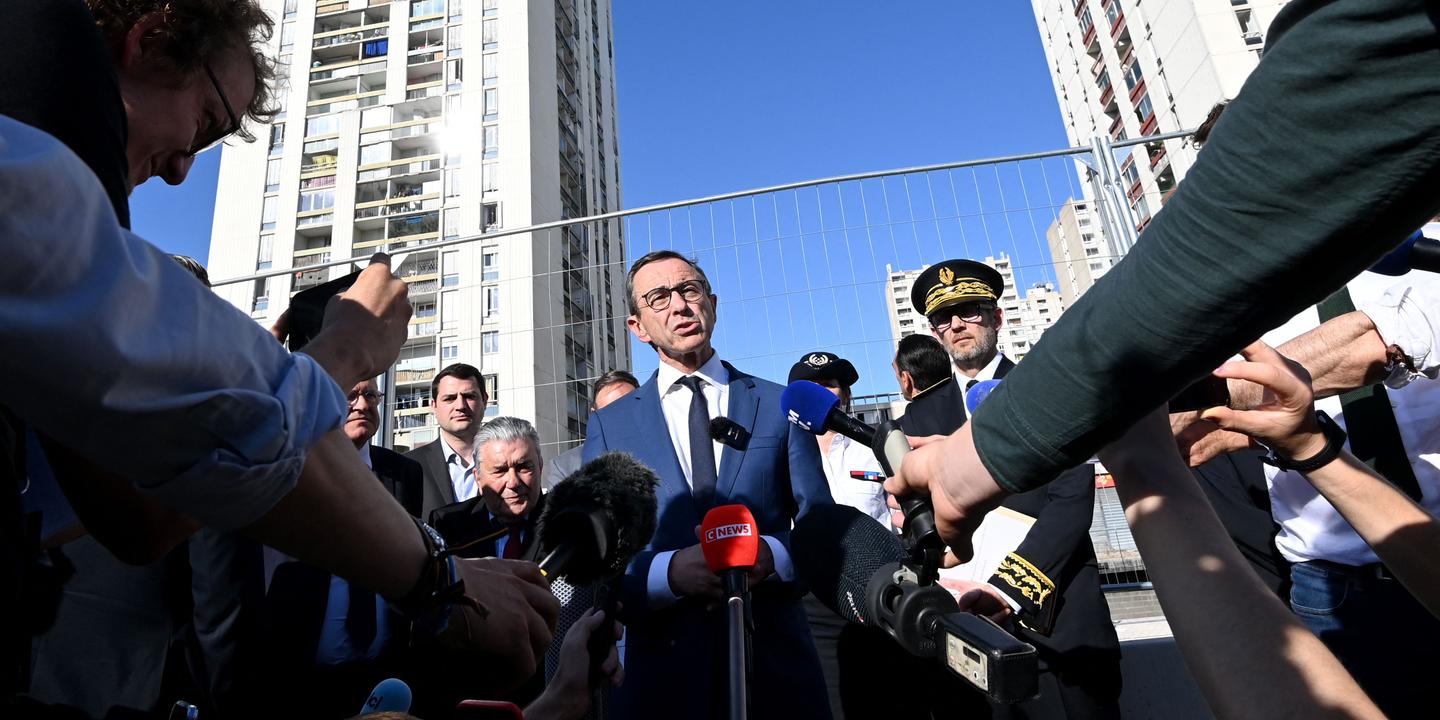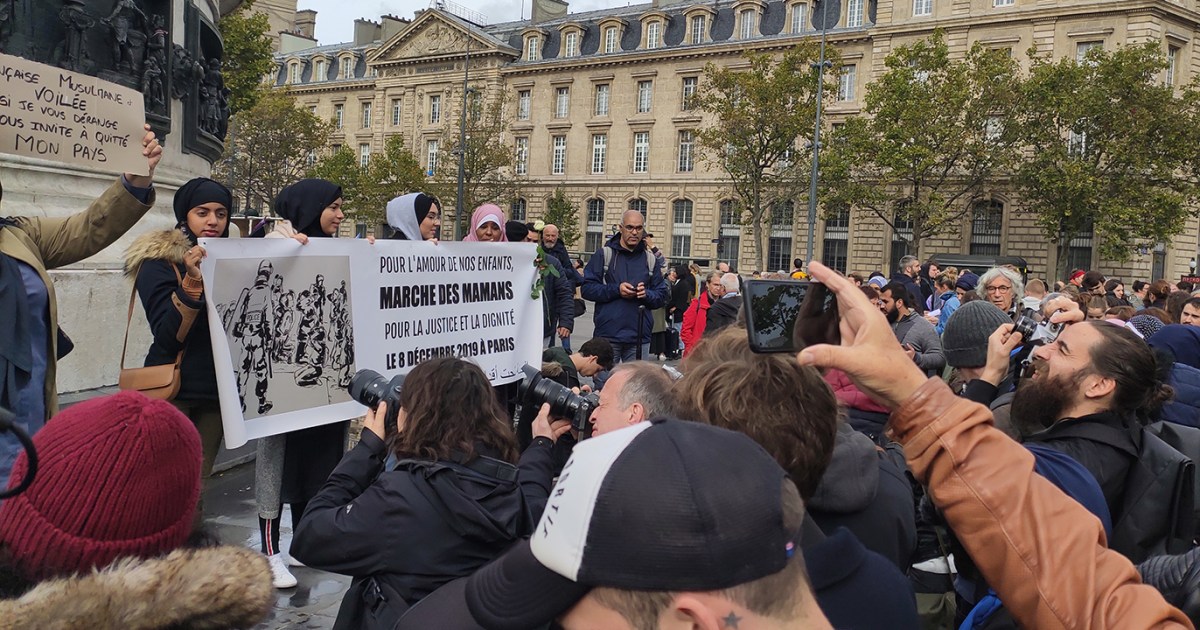Real Breakthrough or Electoral Goals: How France Plans to Confront Political Islamism

“In 2022, a report on Islamophobia in Europe ranked France as one of the most anti-Muslim European countries.”
Once again, French Muslims find themselves under the guillotine of the French government, which claims to protect the values of the Republic and combat political Islamism.
A report on political Islamism in France, particularly the Muslim Brotherhood, has sparked widespread controversy and reactions, amid accusations that Interior Minister Bruno Retailleau is exploiting the situation to influence public opinion ahead of the 2027 elections.
In the context of official French reactions, some called for strict action against the Muslim Brotherhood, while others warned that the report could be exploited to further restrict the country's Muslim community.
Le Figaro quoted French President Emmanuel Macron as promising to present a series of proposals to combat what he described as a deeply rooted phenomenon that has recently worsened.
It is worth noting that Macron inherited a complex structure of historical and political Islamophobia, but he has contributed to modernizing and strengthening it through new tools and methods, deepening its impact on public life.
In 2022, a report on Islamophobia in Europe ranked France as one of the most anti-Muslim European countries, amid widespread hate speech and a decline in legal protection for this minority.
Islamic Influence
A recently released government report on the Muslim Brotherhood and political Islamism in France has sparked widespread political and religious controversy, particularly after it was presented on May 22 during a meeting of the National Defense and Security Council chaired by President Emmanuel Macron.
The French branch of the Muslim Brotherhood has between 400 and 1,000 official members and runs approximately 7% of the country's 2,800 mosques; this represents around 91,000 regular worshippers.
The Federation of French Muslims (FMF), formerly the Union of Islamic Organisations of France, is identified as the national branch of the Muslim Brotherhood in France.
The report listed entities it said were ideological and organizational extensions of the Muslim Brotherhood in France, including the Al-Kindi school in Lyon, the Ibn Khaldoun School in Marseille (IBK), the Islamic Relief France Association (SIF), the Council of European Muslims (CEM), and the Forum of European Muslim Youth and Student Organisations (FEMYSO), among others.
The report noted that the group relies on a strong organization that seeks, in the long term, to modify the rules of secularism and gender equality in France, warning of the group's growing influence on domestic politics.
The report's authors proposed a set of measures aimed at containing ideological threats and regulating the state's relationship with French Muslims in a more balanced manner.
These measures include developing a government discourse based on separating Islam as a religion from Islamism as a political project.
They also proposed controlling foreign funding, increasing transparency in religious education and charitable activities, and intensifying oversight of closed-minded institutions.
The report indicated that since the adoption of the Anti-Separatism Law in August 2021, authorities have carried out 9,537 surveillance operations, leading to the temporary or permanent closure of 741 organizations.

Hardline Measures
While President Macron called for new proposals to counter what he called the Muslim Brotherhood's breakthrough of France, Interior Minister Bruno Retailleau appears to have opted for his own plan, amid a growing debate about the limits of security and freedoms in the country.
Le Figaro reported that Retailleau revealed the outlines of his plan, alleging that the Muslim Brotherhood seeks to subject France to Sharia law and establish an Islamic state.
The newspaper stated that Retailleau’s battle will begin with a broad campaign to disrupt the group's activities through central and local coordination, similar to strategies used in combating terrorism and drug trafficking.
Since France is technically unable to ban the Muslim Brotherhood, as it is not a mass organization but rather an ideological movement, Retailleau intends to hit it financially by freezing financial assets, tightening oversight of its funding sources, and preventing targeted associations from transferring their assets abroad, according to Le Figaro.
The plan also includes administrative measures such as closing institutions considered platforms for disseminating extremist ideas and expanding the powers of security services to monitor suspected activities.
The newspaper noted that approximately 15 funds have been identified for financing private initiatives, such as the construction of places of worship or Quran memorization schools, in contravention of their stated mission of serving the public interest.
It added that, to date, nine judicial dissolution decisions have been implemented for funding funds in six cities—eight of which are linked to the Brotherhood and one is Turkish—out of 18 judicial procedures, and seven more are underway.
The French website Mediapart confirmed a few days ago that the report on the Muslim Brotherhood's influence in France is far from the alarmist message Minister Retailleau sought to convey, noting that the figures show a clear decline in the group's influence in the French Islamic scene.
In October, Minister Retailleau said he was not ruling out classifying the Muslim Brotherhood as a terrorist group and banning it, while advocating for the establishment of a new criminal offence to fight political Islam in the country.
“We must be particularly wary of this Islamist infiltration that is spreading within associations, sports clubs, schools and even local authorities,” he added.

Political Agendas
According to observers, the manner in which the report was presented to the French public raised concerns that it could be used as a pretext for discrimination against Muslims.
In a statement, the French Council for the Muslim Religion (CFCM) said it was concerned that the allegations leveled against the Muslim Brotherhood risked creating a climate of constant suspicion around French Muslims.
It also called on French authorities to exercise wisdom and discretion in dealing with this issue, while avoiding being drawn into media or political agendas that could deteriorate social relations in the country.
The FEMYSO issued a statement rejecting any attempt to associate it with political entities, while the FMF called the accusations unfounded.
In turn, Chems-Eddine Hafiz, the dean of the Grand Mosque of Paris, expressed his concern about the stigmatization of Muslims in France under the pretext of combating political Islam, serving what he considered political agendas.
“The mosque has always defended a vision of Islam that is consistent with the letter and spirit of the principles of the French Republic and has refused to allow the misuse of Islam for political purposes aimed at dividing the national community,” he said.
For his part, political writer Salim Hakimi pointed out, in a statement to Al-Estiklal, that the absence of a precise definition of the term Muslim Brotherhood in the French context opens the door to categorizing any committed Muslim within this framework without a clear legal basis.
He confirmed that there are a number of political electoral goals behind the timing of the report's publication, anticipating that French public opinion is currently being prepared before a draft law is submitted to Parliament to confront what he called ‘Islamic breakthrough’.
“Although the report claimed that Islam as a religion is not targeted, but rather the intent is to confront a political project that uses Islam as a cover, practical measures confirm that the target is Islamic manifestations in general,” he added.
Mr. Hakimi concluded that “the French authorities will focus their initial battle against the Muslim Brotherhood for the time being, and if successful, their measures will later expand against broader segments of Muslims.”

Rising Islamophobia
Although the full report was not published at the time, the leaked excerpts were enough to ignite a heated debate among French political parties, with reactions ranging from support to condemnation.
Supporters see it as a necessary step to strengthen national cohesion, preserve secularism, and confront trends that threaten French identity.
Others, however, warn against using it as a pretext to restrict Muslims or expand the persecution of what the government calls ‘Islamic isolationism’.
The far-right exploited the ongoing controversy with Jordan Bardella, leader of the National Rally party, calling for a ban on the Muslim Brotherhood.
He also called for the closure of 139 mosques, 280 associations, and 21 schools allegedly linked to the Brotherhood, as well as the expulsion of foreign imams believed to be promoting hatred within French society.
He considered this part of a strategy to combat what he described as radical political Islam.
French far-right Member of the European Parliament, Marion Marechal, called for signing a petition titled ‘Stop the Muslim Brotherhood’.
She called for the organization to be banned, its institutions to be closed, and foreigners associated with it to be expelled.
She also called for holding accountable officials who colluded with the group for electoral purposes.
However, the statement that sparked the most controversy came from within President Emmanuel Macron's party, specifically from its Secretary-General Gabriel Attal, who said that the report reveals an organized and coordinated attack on republican values and principles.
In contrast, Jean-Luc Melenchon, leader of France Unbowed (LFI) party, warned against what he described as an attempt to destroy France and the unity of the country, considering that such tactics directly lead to what he described as a cruel inquisition against individuals.
Segolene Royal, former Minister of the Environment, warned of dangerous consequences, accusing Retailleau of inflaming social tensions and generalizing accusations against Muslims.
The French Human Rights League (LdH) considered that the use of vague terms such as ‘Islamic ecosystems’ could lead to the arbitrary targeting of Muslim communities, which constitute approximately 10% of the population.

In the same context, Minister Retailleau has come under criticism from some left-wing political forces, who have accused him of using the report as part of a media campaign to serve his political ambitions, especially after his recent election as leader of the Republicans party, which strengthens his chances as a potential right-wing candidate in the upcoming 2027 presidential election.
French journalist Jean-Michel Abbate commented on TV1 that the media campaign accompanying the publication of the report was not merely a leak of information, but rather a deliberate attempt to bolster Retailleau's image as a leader in the face of political Islamism.
Sources
- The shocking report on the Muslim Brotherhood, which wants to establish Sharia law in France [French]
- Critical report on Muslim Brotherhood could 'rekindle a sense of fear' in France, says expert
- France is waking up to the threat of the Muslim Brotherhood
- Leaked Muslim Brotherhood report criticized as ‘alarmist’ by academics and civil society












